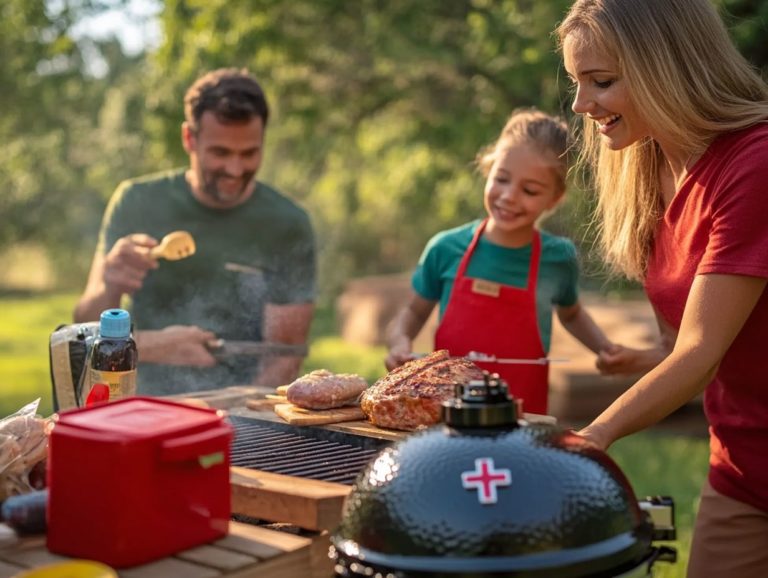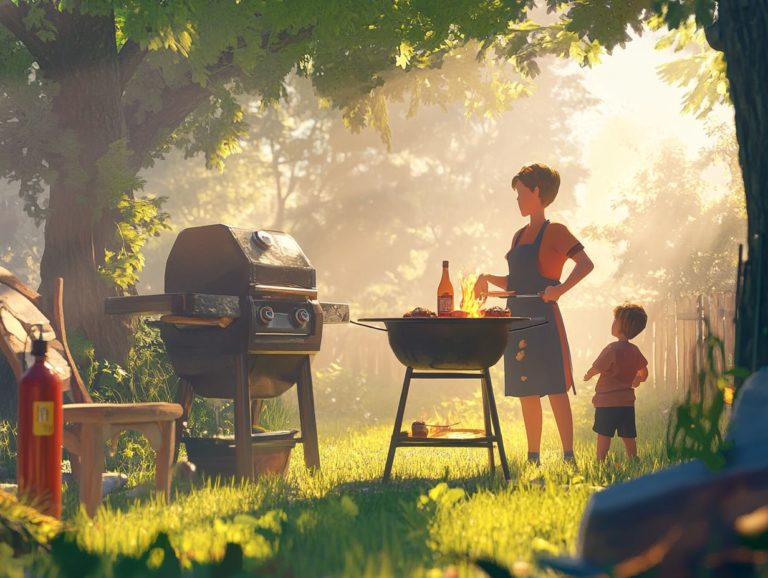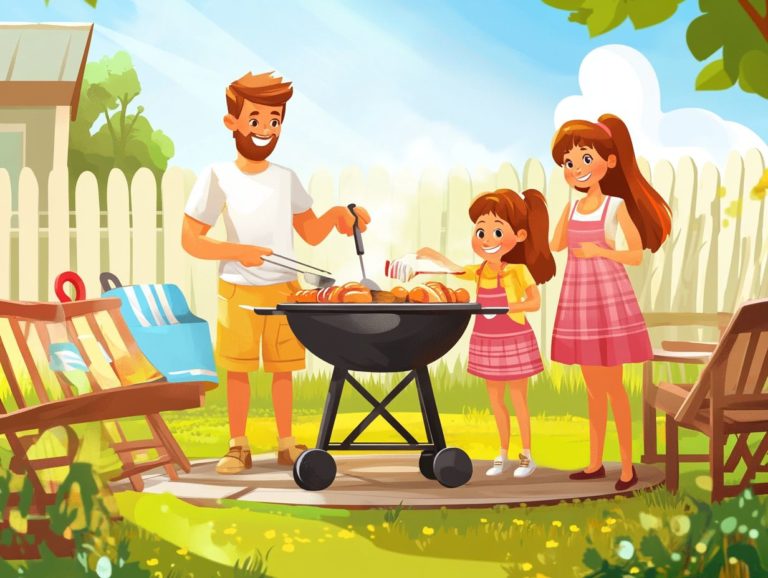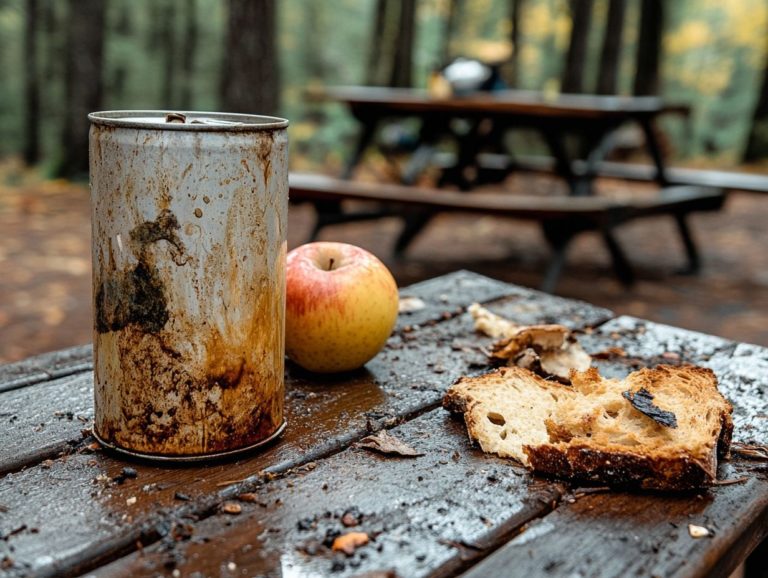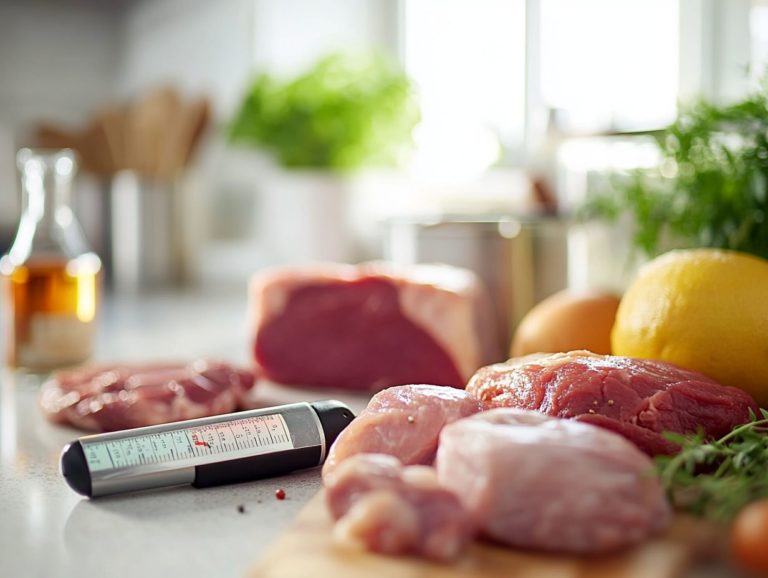5 Ways to Ensure Safe Cleanup After Outdoor Cooking
After a delightful day of outdoor cooking, the last thing you want to think about is the cleanup. However, ensuring a thorough and safe cleanup is crucial for both your health and the longevity of your cooking equipment.
This article delves into five essential steps to keep your grill and outdoor area spotless. It emphasizes the importance of proper food storage and disposal while discussing the dangers of neglecting cleanup. You ll also find valuable tips to prevent foodborne illnesses.
Are you ready to elevate your next outdoor cooking experience to be both safe and enjoyable? Let s dive in!
Contents
- Key Takeaways:
- 1. Clean the Grill Thoroughly
- 2. Dispose of Charcoal and Ash Properly
- 3. Clean Up Spills and Grease Immediately
- 4. Store Food Properly
- 5. Properly Dispose of Leftover Food
- What Are the Dangers of Not Cleaning Up After Outdoor Cooking?
- Frequently Asked Questions
- What are the 5 ways to ensure safe cleanup after outdoor cooking?
- Why is it important to wash your hands before and after handling food?
- How can separate cutting boards and utensils help with safe cleanup after outdoor cooking?
- What should I do with leftovers after outdoor cooking?
- How can I keep my cooking area clean during outdoor cooking?
- Why is it important to dispose of food waste properly?
Key Takeaways:
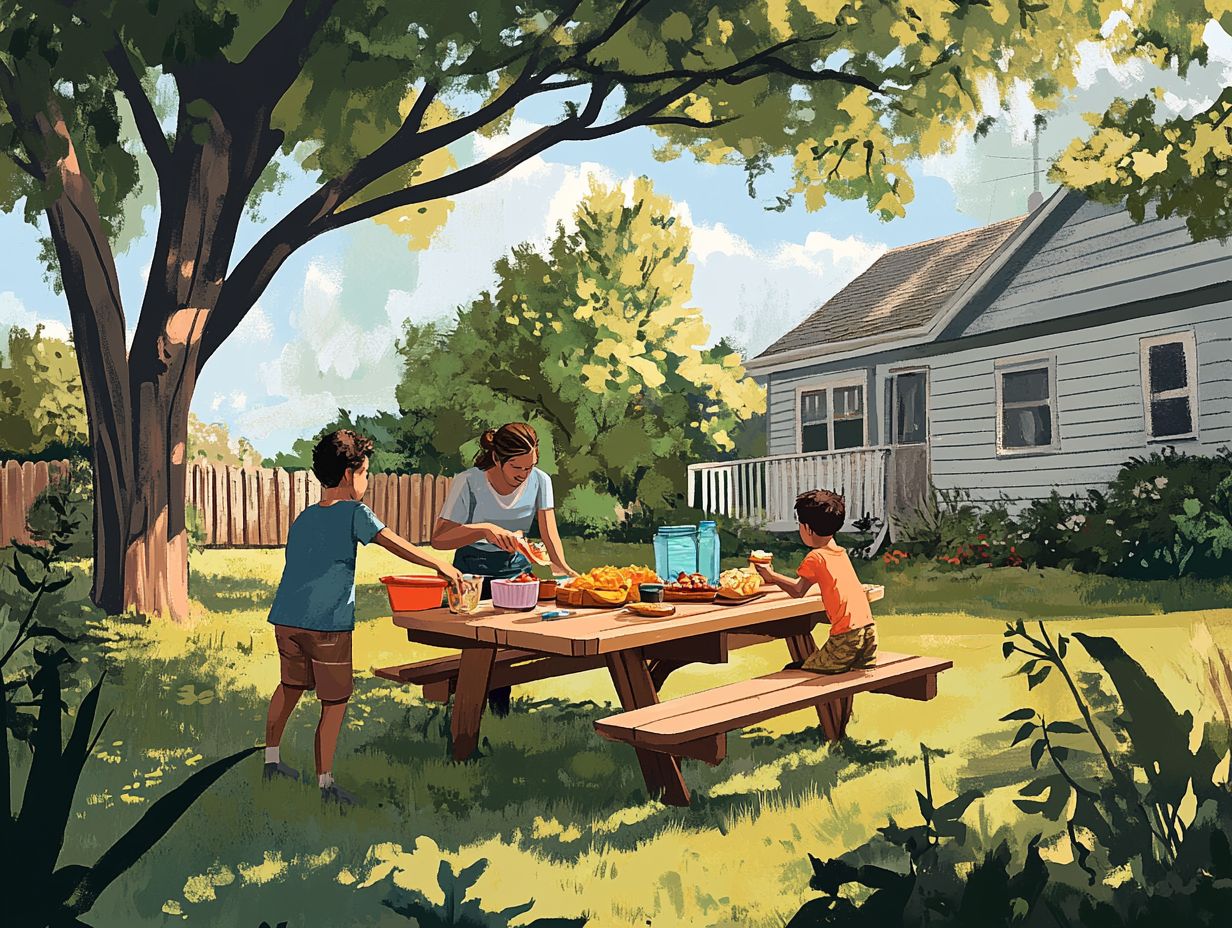
- Clean your grill after every use to keep bacteria away!
- Dispose of charcoal and ash in a designated area, away from flammable materials.
- Quickly clean up spills and grease to prevent accidents and maintain a safe cooking area.
1. Clean the Grill Thoroughly
Cleaning your grill after outdoor cooking is essential for maintaining hygiene and ensuring your next camping adventure is enjoyable and free from pesky foodborne illnesses. To stay informed, check out the top risks of outdoor cooking and how to avoid them, especially when you’re whipping up mouthwatering campfire recipes like Campfire Quesadillas and Campfire Roasted Sweet Potatoes on a Coleman Stove.
By following a simple, step-by-step process, you can make this task easy and effective:
- Start by letting the grill cool down a bit better safe than burnt.
- Once it’s at a manageable temperature, grab a pot scraper and gently remove any charred bits or residue from the grates, taking care not to scratch the surface.
- Next, mix up a solution of biodegradable soap and warm water eco-friendliness is key.
- After giving the grill a good wipe down with this solution, be mindful of any leftover cleaning water, which can harm the environment if not disposed of properly.
- Always dispose of it properly by scattering it widely in areas that can absorb it or rinsing it away in established sinks.
By adhering to these guidelines, you not only keep your grill in tip-top shape but also promote outdoor ethics and embrace the principles of Leave No Trace, all while following fire safety best practices for outdoor cooking.
2. Dispose of Charcoal and Ash Properly
Proper disposal of charcoal and ash is vital to your camping cleanup efforts, as mishandling can lead to environmental damage and fire hazards during your outdoor cooking adventures.
Use designated trash stations now to protect the environment! This practice minimizes the risk of contaminating nearby water sources and aligns perfectly with the core principles of outdoor ethics and Leave No Trace.
Refraining from dumping these materials in natural areas helps preserve the ecosystem and protects wildlife habitats. Adhering to these best practices not only enhances your own outdoor experience but sets a positive example for fellow campers who share your love for nature.
3. Clean Up Spills and Grease Immediately
Cleaning up spills and grease right away during outdoor cooking not only keeps unwanted wildlife at bay but also ensures a clean and safe cooking environment for everyone in your camping group. For more tips, check out best practices for outdoor cooking clean-up.
To effectively manage these messes, equip yourself with biodegradable soap and dependable dishwashing supplies. Start by blotting the spill with an absorbent cloth to minimize the mess. Then, apply a small amount of soap diluted in warm water. Gently scrub the area with a sponge, making sure to lift away all the grease. Rinse thoroughly with fresh water to eliminate any soap residue.
Creating a cleaning checklist can streamline your efforts, helping you remember to tackle all the key areas, such as:
- Tables
- Cooking surfaces
- The ground
This comprehensive cleanup is essential for preserving the outdoor environment and elevating the overall camping experience.
What are your best tips for cleaning up after outdoor cooking? Share them with us!
4. Store Food Properly
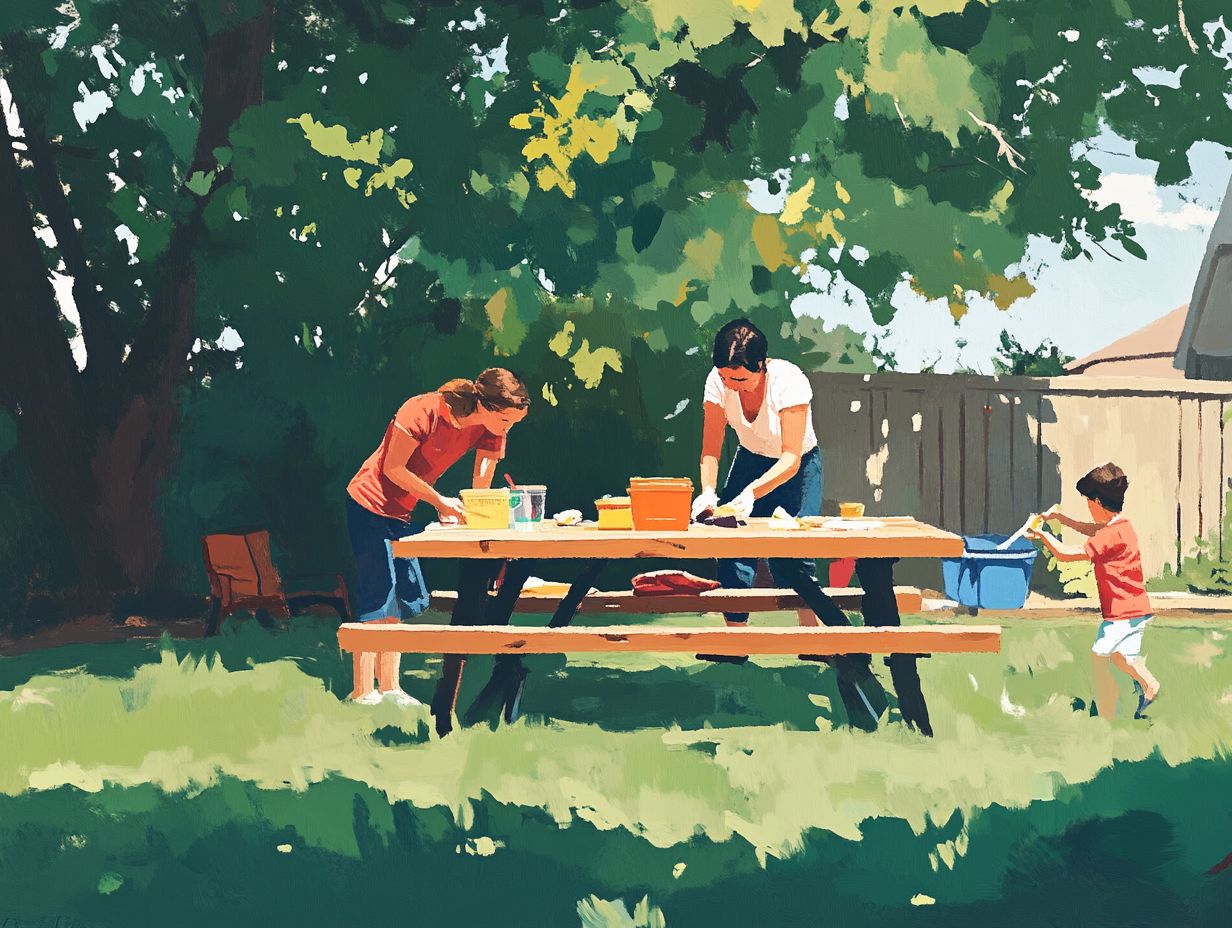
Properly storing food while camping is essential for minimizing waste. It elevates your outdoor cooking experience, especially when preparing dishes like Eggplant Caponata or Soyrizo Stuffed Mushrooms that require careful handling and storage of leftovers.
Investing in airtight containers is highly advisable; they act as a robust barrier against moisture and pests, which can be particularly crucial in a forested or riverside setting. Coolers also play a vital role in keeping perishables fresh, significantly reducing the risk of spoilage during your adventure.
Be sure to store food away from potential contaminants, such as soap or cleaning tools, for safe cooking. Remember, proper food storage requires good hygiene practices, including the responsible management of gray water, which is the used water from washing dishes or cleaning. Disposing of gray water thoughtfully allows you to uphold cleanliness and minimize the attraction of unwanted critters, ultimately enriching your entire camping experience.
5. Properly Dispose of Leftover Food
Properly disposing of leftover food is essential for your camping cleanup. It not only helps you avoid unwanted wildlife encounters but also minimizes your impact on the environment, aligning perfectly with outdoor ethics and the Leave No Trace principles.
Use designated trash stations to dispose of food scraps safely and responsibly. Additionally, adopting composting strategies for organic waste elevates soil quality and encourages eco-friendly practices among fellow campers.
Recognizing the importance of minimizing food waste not only helps preserve the stunning landscapes you cherish but can also enhance your camping experience by fostering a sense of responsibility and care for nature. When you re mindful of your food disposal, you contribute to cleaner campsites, creating a more enjoyable environment for future visitors!
What Are the Dangers of Not Cleaning Up After Outdoor Cooking?
Failing to tidy up after your outdoor cooking can lead to serious dangers, like attracting wildlife, heightening the risk of foodborne illnesses, and negatively impacting the camping environment. To ensure safe practices, consider following the top 10 safety tips for outdoor cooking equipment, as all of this can compromise the enjoyment and safety of your future outdoor adventures.
Imagine wild animals, lured in by leftover food scraps and enticing odors, posing real threats to your camping experience. For instance, incidents involving bears have surged by 20% in areas where cleanup practices are lacking.
Neglecting proper hygiene can also contribute to foodborne illnesses; the Centers for Disease Control and Prevention (CDC) estimates that 1 in 6 Americans suffer from food poisoning each year, often due to improper food waste management.
Leftover food can rot, attracting pests and increasing contamination risks. By ensuring a thorough cleanup after your outdoor meals, you significantly reduce the chances of unwelcome visitors while promoting a healthier and more enjoyable experience in nature!
What Are the Best Cleaning Products to Use for Outdoor Cooking?
Choosing the right cleaning products for your outdoor cooking is crucial for effective sanitation and environmentally friendly practices. Biodegradable soap and specialized dishwashing supplies should be your go-to options as an avid camper. Always have your cleanup supplies ready for washing dishes after meals.
These eco-conscious choices not only help preserve the delicate balance of local ecosystems but also give you peace of mind, knowing your selections won t harm local wildlife. For example, the MSR Alpine Dish Brush is your secret weapon for scrubbing away stubborn grime from pots and pans, thanks to its durable bristles and ergonomic design that make it a breeze to handle. Don’t forget to pack some cold water for rinsing!
Brands like Camp Suds provide biodegradable dish soap that cuts through grease effortlessly without leaving behind harmful residues. Don t forget to pack recycled microfiber cloths for drying; they ensure your cooking utensils are spotless and ready for the next meal while keeping your ecological footprint in check as you enjoy the great outdoors!
How Often Should One Clean Their Grill?
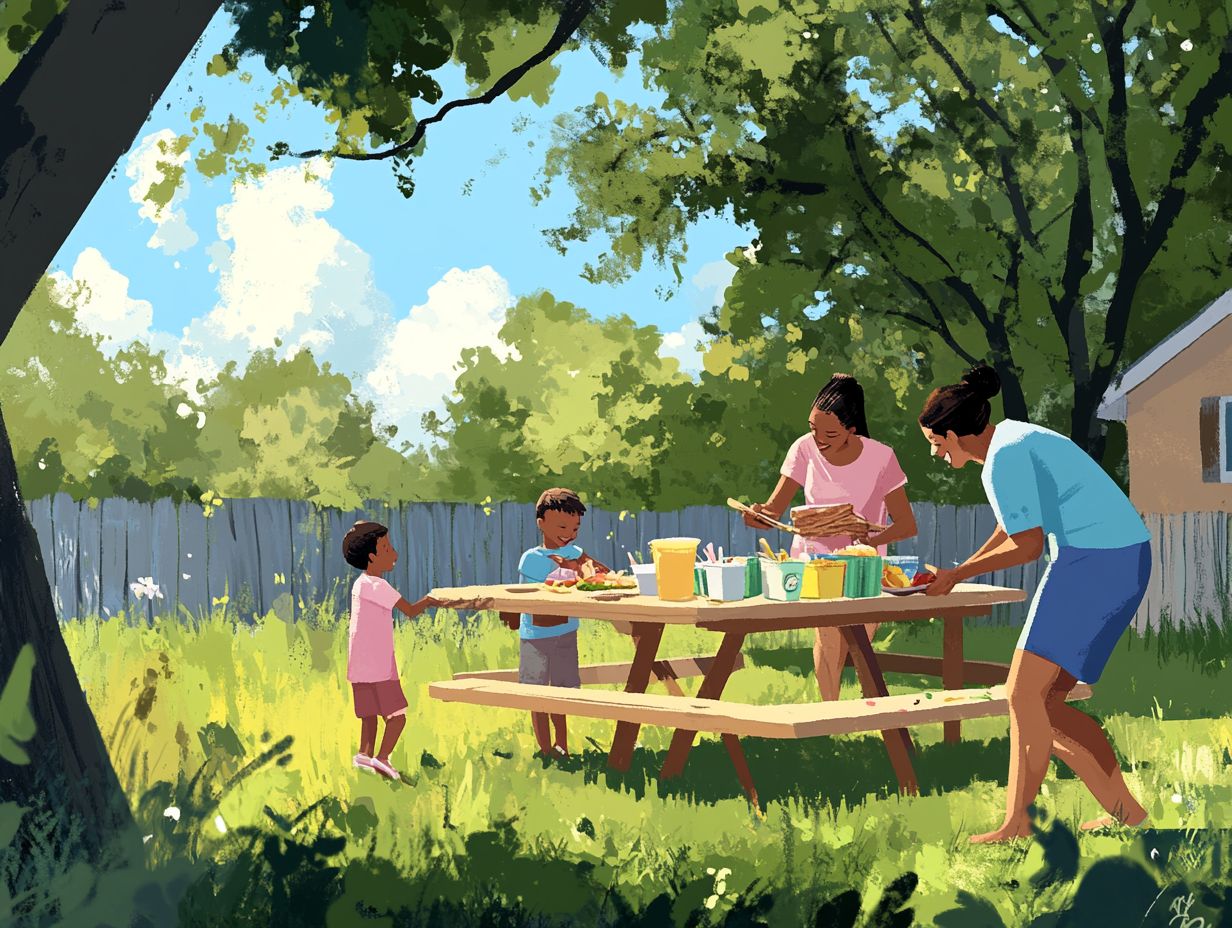
Regular maintenance of your grill is essential. Ideally, you should clean it after every use to prevent grease buildup and ensure optimal performance for your next outdoor cooking adventure. Incorporating a cleaning checklist can help you stay organized.
In addition to cleaning after cooking, you should schedule deep cleanings periodically, especially if you’re grilling frequently or whipping up sticky or fatty dishes. This routine helps eliminate any charred residue that could introduce off-flavors into your future meals. Furthermore, it’s vital to be aware of how to minimize fire risks while cooking outside.
A clean grill not only elevates the taste of your food but also extends the lifespan of your equipment. Accumulated grime can lead to wear and potential malfunctions, which is the last thing you want!
By keeping your grill in prime condition, you ensure it operates efficiently, providing even heat distribution and superior cooking results. This way, every outdoor gathering you host is destined for success!
What Are the Best Practices for Storing Food After Outdoor Cooking?
Implementing best practices for storing food after outdoor cooking is vital for preserving the quality of your leftovers and ensuring they remain safe to eat during your camping trip.
Using coolers filled with ice packs helps maintain a safe temperature for perishables. Sealing leftovers in airtight containers prevents moisture and air exposure, which can spoil food rapidly. It s also crucial to use proper sealing techniques, such as pressing out excess air from bags, which not only extends freshness but also minimizes the risk of contamination.
By following these practices, you can significantly reduce food waste and contribute to healthier eating habits while enjoying the great outdoors. This thoughtful approach to food storage enhances your overall camping experience, ensuring that your meals remain enjoyable and nourishing throughout the trip! Start implementing these tips today!
How Can One Prevent Foodborne Illnesses After Outdoor Cooking?
Preventing foodborne illnesses after outdoor cooking demands your commitment to strict cleaning habits and food safety measures. It’s essential that you meticulously follow all cooking and cleanup processes, including 5 ways to stay safe while cooking over a campfire.
To achieve this, prioritize washing your hands frequently with soap and water, especially before and after handling food. It s crucial for you to use separate cutting boards for raw meats and cooked foods to avoid cross-contamination, thereby safeguarding your meals.
Implementing proper storage techniques such as refrigerating perishable items and keeping cooked foods at the right temperatures will significantly enhance your dining experience s safety.
By incorporating these key practices into your routine, you can not only reduce the risk of foodborne illnesses but also elevate your outdoor culinary adventure into a more enjoyable and worry-free experience!
Frequently Asked Questions
What are the 5 ways to ensure safe cleanup after outdoor cooking?
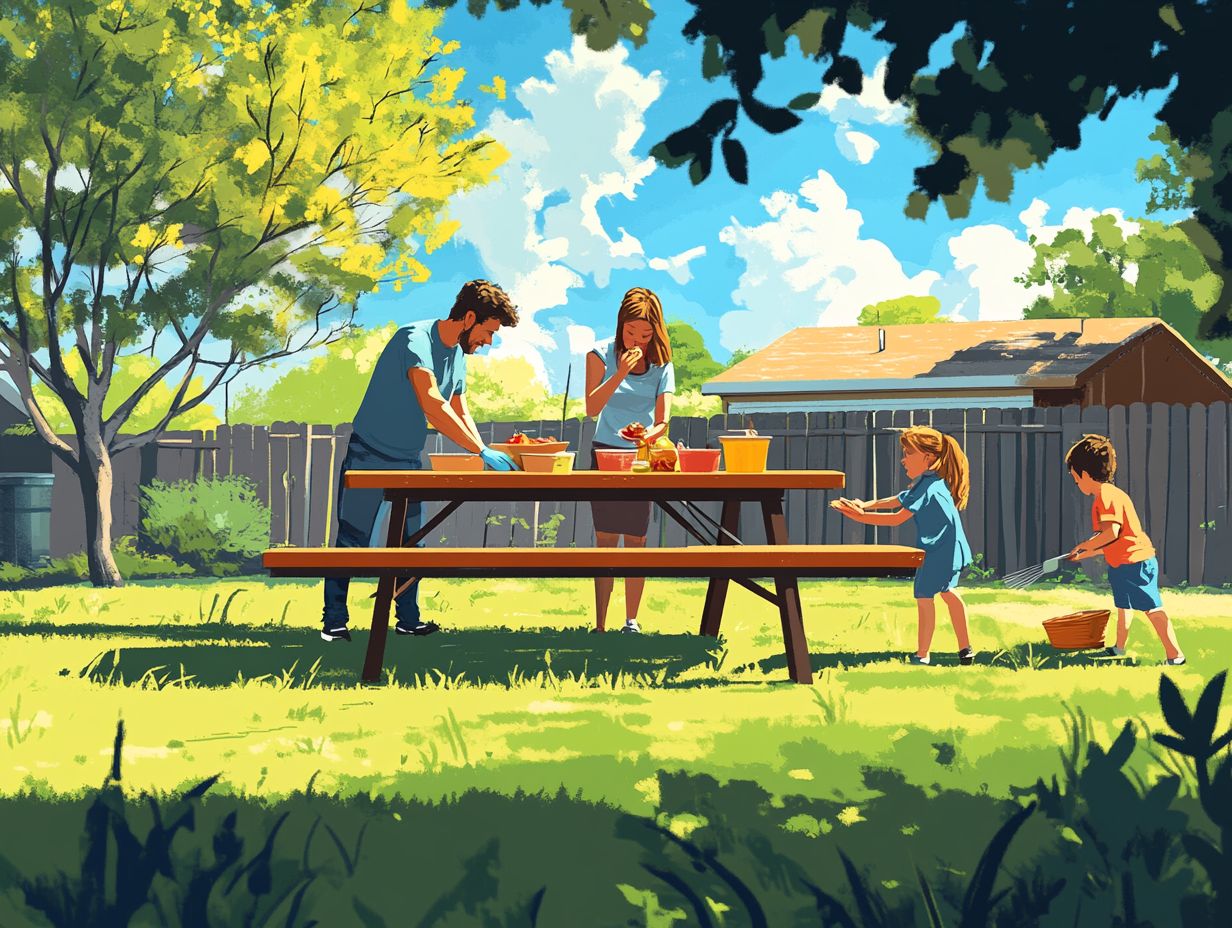
- Always wash your hands before and after handling food.
- Use separate cutting boards and utensils for raw and cooked food.
- Properly store leftovers and ensure they are reheated to the correct temperature.
- Keep your cooking area clean.
- Dispose of food waste properly.
Why is it important to wash your hands before and after handling food?
Washing your hands before and after handling food helps prevent the spread of bacteria and other harmful pathogens. This is especially important when dealing with raw meats, as they can contain harmful bacteria that can cause foodborne illnesses.
How can separate cutting boards and utensils help with safe cleanup after outdoor cooking?
Using separate cutting boards and utensils for raw and cooked food can help prevent cross-contamination. This means that harmful bacteria from raw food won’t come into contact with cooked food, reducing the risk of foodborne illnesses.
What should I do with leftovers after outdoor cooking?
Store leftovers in airtight containers. Place them in the refrigerator or freezer, and remember to label and date each container.
Always reheat leftovers to the right temperature before eating.
How can I keep my cooking area clean during outdoor cooking?
Keeping your cooking area clean is key for safety. Wipe down surfaces with disinfectant and dispose of food waste properly. Additionally, consider checking out how to prepare for safe outdoor cooking experiences to enhance your cooking safety.
Change out dirty utensils and cutting boards regularly.
Why is it important to dispose of food waste properly?
Properly disposing of food waste prevents bacteria spread and keeps pests away. Use a sealed garbage bag for food waste.
Take it to a trash bin that s far from your cooking and eating areas.

